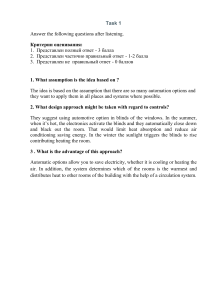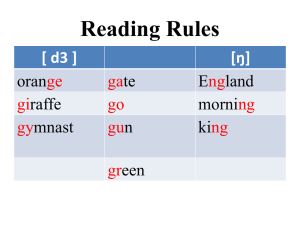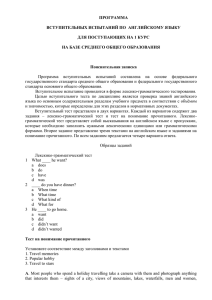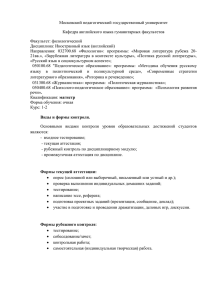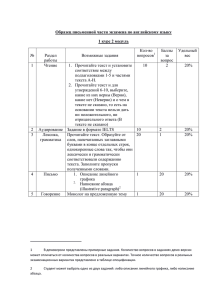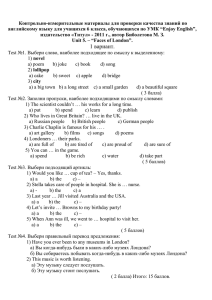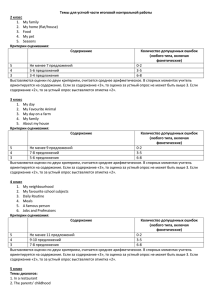10-11 класс 2007-2008 учебный год
реклама
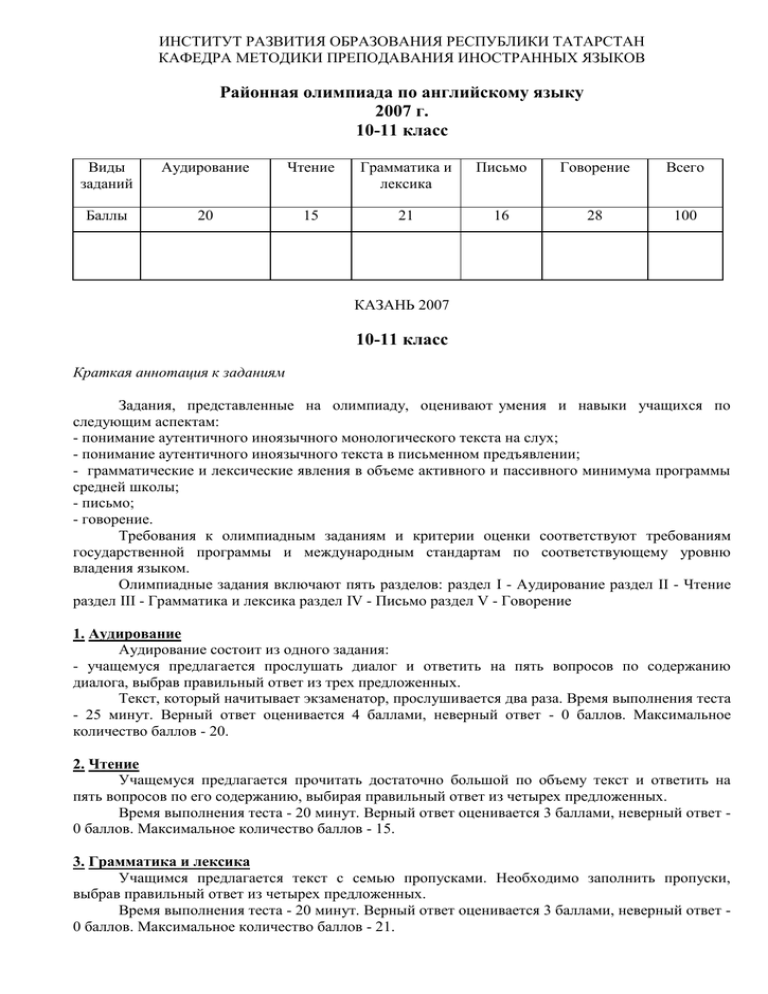
ИНСТИТУТ РАЗВИТИЯ ОБРАЗОВАНИЯ РЕСПУБЛИКИ ТАТАРСТАН КАФЕДРА МЕТОДИКИ ПРЕПОДАВАНИЯ ИНОСТРАННЫХ ЯЗЫКОВ Районная олимпиада по английскому языку 2007 г. 10-11 класс Виды заданий Аудирование Чтение Грамматика и лексика Письмо Говорение Всего Баллы 20 15 21 16 28 100 КАЗАНЬ 2007 10-11 класс Краткая аннотация к заданиям Задания, представленные на олимпиаду, оценивают умения и навыки учащихся по следующим аспектам: - понимание аутентичного иноязычного монологического текста на слух; - понимание аутентичного иноязычного текста в письменном предъявлении; - грамматические и лексические явления в объеме активного и пассивного минимума программы средней школы; - письмо; - говорение. Требования к олимпиадным заданиям и критерии оценки соответствуют требованиям государственной программы и международным стандартам по соответствующему уровню владения языком. Олимпиадные задания включают пять разделов: раздел I - Аудирование раздел II - Чтение раздел III - Грамматика и лексика раздел IV - Письмо раздел V - Говорение 1. Аудирование Аудирование состоит из одного задания: - учащемуся предлагается прослушать диалог и ответить на пять вопросов по содержанию диалога, выбрав правильный ответ из трех предложенных. Текст, который начитывает экзаменатор, прослушивается два раза. Время выполнения теста - 25 минут. Верный ответ оценивается 4 баллами, неверный ответ - 0 баллов. Максимальное количество баллов - 20. 2. Чтение Учащемуся предлагается прочитать достаточно большой по объему текст и ответить на пять вопросов по его содержанию, выбирая правильный ответ из четырех предложенных. Время выполнения теста - 20 минут. Верный ответ оценивается 3 баллами, неверный ответ 0 баллов. Максимальное количество баллов - 15. 3. Грамматика и лексика Учащимся предлагается текст с семью пропусками. Необходимо заполнить пропуски, выбрав правильный ответ из четырех предложенных. Время выполнения теста - 20 минут. Верный ответ оценивается 3 баллами, неверный ответ 0 баллов. Максимальное количество баллов - 21. 4. Письмо В этом задании предлагается составить письменное высказывание с элементами рассуждения по предложенной теме. Объем высказывания не должен превышать 200-250 слов. Время выполнения теста - 40 минут. Задание оценивается суммой баллов по следующим аспектам: соответствие заданию, объем - 4 балла; грамматика, пунктуация, правописание - 4 балла; лексическая, структурная насыщенность - 4 балла; общее впечатление, стиль изложения - 4 балла. Максимальное количество баллов - 16. 5. Говорение В устном туре участвуют все конкурсанты. Участники выступают по одному перед членами жюри. Задание - диалог с целью обмена оценочной информацией. Предлагается некая проблема. Задача учащегося обсудить с партнером несколько вариантов решения проблемы и найти оптимальное решение. Участникам предоставляется 1 минута на подготовку. Выступление должно длиться не более 3-х минут. Критерии оценки: фонетика - 7 баллов, грамматика - 7 баллов, лексическая насыщенность - 7 баллов, адекватность теме - 7 баллов. Максимальное количество баллов - 28. Материалы экзаменатора Процедура проведения олимпиады Олимпиада проводится по модели международных экзаменов по английскому языку. Ответы на вопросы экзаменатор должен давать на свое усмотрение и только на иностранном языке. Экзаменатор не отвечает на вопросы, касающиеся правильности выполнения задания, т.е. не подсказывает правильный ответ. Экзаменатору предлагается следовать обязанностям, изложенным ниже: - экзаменатор должен убедиться, что учащиеся сидят на достаточном расстоянии друг от друга, чтобы избежать списывания и других нечестных способов работы. (По международным требованиям необходимо расстояние не менее 2-х метров с каждой стороны.) Во время олимпиады недопустимы разговоры между учениками; - парты и столы, используемые при тестировании, должны быть освобождены от всех вещей и материалов, не связанных с выполнением заданий олимпиады; на олимпиаде учащимся разрешено пользоваться одноязычными словарями, исключая специализированные словари по грамматике и лексике иностранного языка. Не допускается использование электронных словарей. Учащимся запрещено пользоваться какими-либо пособиями или книгами, проносить какие-либо посторонние бумаги в комнату, где будет проходить олимпиада. Учащиеся должны быть обеспечены бумагой и другими материалами, необходимыми для работы. Экзаменаторы должны обратить внимание учащихся на детали, требующие особой аккуратности. Экзаменатор должен строго следить за соблюдением временных нормативов. Подсчет результатов производится на основании оценочной шкалы для каждого проверяемого задания и суммарного балла. 1. Аудирование: 5 положений. 4 балла за каждый правильный ответ. Всего 20 баллов. 2. Чтение: 5 положений. 3 балла за каждый правильный ответ. Всего 15 баллов. 3. Грамматика и лексика: 7 положений. 3 балла за каждый правильный ответ. Всего 21 баллов. 4. Письмо: Критерии оценки в таблице 1. Всего 16 баллов. Таблица 1. 1. Соответствие заданию, объем 2. Грамматика, пунктуация, правописание 3. Лексическая, структурная насыщенность 4. Общее впечатление, стиль изложения Протокол №1. № Код п/п 0-4 баллов 0-4 баллов 0-4 баллов 0-4 баллов Соответствие Грамматика, Лексическая, Общее заданию, пунктуация, структурная впечатление, объем правописание насыщенность стиль изложения Всего 1. 5. Говорение: Критерии оценки в таблице 2. Всего 28 баллов. Таблица 2. Фонетика 1. 2. Грамматика 3. Лексическая насыщенность 4. Адекватность теме Протокол №2. № Код Фонетика п/п 1. % 0-7 баллов 0-7 баллов 0-7 баллов 0-7 баллов Грамматика Лексическая насыщенность Адекватность Всего теме Общие результаты выполнения олимпиадных заданий заносятся в сводный протокол олимпиады (см. протокол №3) Протокол №3 (сводный) № ФИО ученика (код) Виды заданий п/п Аудирование Чтение 20 1. 2. 15 Грамматика и лексика 21 Письмо Говорение Всего 16 28 100 I. Аудирование Вы услышите интервью с известной писательницей. Обведите цифру 1, 2 или 3, соответствующую выбранному вами варианту ответа. A. Catherine mainly gets inspiration for her novels from 1) things that happen in her personal life. 2) unimportant news stories. 3) major events in the local area. B. The example of the shopping centre shows that, before writing, Catherine 1) interviews a lot of people. 2) does a lot of background research. 3) imagines a complete story. C. Catherine says her characters 1) can be identified by the people they're based on. 2) are exact copies of people she has known. 3) are only loosely based on real people. D. Catherine is most likely to create a character based on a real person's 1) history 2) appearance 3) view of the world. E. There is a chance that 1) Catherine will give a talk about making films. 2) a company will buy the film rights to Fire At Dawn. 3) there will be a film version of Fire At Dawn. II. Чтение Прочитайте текст и выполните задания А-Е, обводя цифру 1, 2, 3 или 4, соответствующую номеру выбранного вами варианта ответа. It was the day the exam results were to be published. I tried to put off going to school and joining the excited crowd of students for as long as possible, but eventually my mum's glances at the clock became too much and I reluctantly picked my coat up and set off. As I slowly walked, my stomach turning over with anxiety, I could picture the others, gathering around the noticeboard that announced the passes that would make such a difference to their lives. It had all seemed quite different six months before. I had never been exactly a model student, but I had always managed to more or less keep up through a combination of quick thinking and last-minute work. Then Davina had come into my life and academically things had definitely started to get worse. Suddenly, there was an interesting, confident, funny friend to spend my time with and my books just gathered dust on my desk. Essays and projects got later and later, while my social life improved to the point where my mum felt that she had to take action. Realizing that a direct command was unlikely to work, she tried to reason with me. The problem was that arguments about future careers and opportunities were much less persuasive than the text party or the next evening out. Although we never had a row about it, I could see that she was disappointed and concerned. The exams themselves had come and gone. All I remembered about them now as I went through the school gates was a feeling that half the questions were about things that we hadn't done in class. The way the people around me in the exam room filled page after page with answers proved, though, that they didn't share that feeling. While they excitedly left the room asking each other what answer they had put for each question, I quickly disappeared before anyone could ask me. Some of those same faces crowded around the noticeboard as I approached, most of them with an expression of relief. 'Rose!' it was Mrs Black, our English teacher. In spite of all the missed work, Mrs Black had supported me and done her best to prepare me for the exam, even offering to have extra lessons with me and a few of the others. Although I hadn't taken her up on the offer, I was thankful that she hadn't given up on me like some of the other teachers had. I smiled at her. A. Before visiting the school to get her results, Rose 1) waits to build up the excitement. 2) delays going until she has to. 3) worries that she might be late. 4) feels that she might be getting ill. B. Rose says that before meeting Davina she had 1) never realized how important schoolwork was. 2) considered trying to became a model. 3) done better at school than she did afterwards. 4) put a lot of effort into her studies. C. Rose's mum became worried about her and 1) pointed out the advantages of doing well at school. 2) prevented Rose from seeing Davina so often. 3) offered to help Rose finish her work on time. 4) told her to leave school and get a job. D. Rose suggests that the others taking the exams 1) didn't realize that there was a problem with the exam paper. 2) were unable to prove that they had understood the exam. 3) wanted to copy her answers to the exam questions. 4) were better prepared for the exam than she was. E. Rose is grateful to Mrs Black because 1) the extra lessons made a big difference 2) she continued to believe that Rose could do well. 3) she never insisted on Rose doing her homework. 4) the work in her lessons was quite easy. III. Грамматика и лексика Прочитайте текст с пропусками, обозначенными номерами 1-7. Эти номера соответствуют заданиям A-G, в которых представлены возможные варианты ответов. Обведите номер выбранного вами варианта ответа. Peter Madison was an antiques dealer, which meant that he spent his days either serving customers in his small shop or trying to sell his antiques at antiques fairs. Today was the day of the Redwood Antiques Fair and Peter had a stall there. He got there early and (1)___________ out on display various objects that he though might sell well, like a gold cigarette case and a silver teapot. Eventually, members of the (2) ___________ began to walk around the stalls, occasionally stopping to examine something. Peter sold a few (3)___________and it was soon lunchtime. He decided to walk around a little and he asked the dealer next to him to keep an eye on his stall while he was away. He bought a sandwich and chewed it as he (4)'___________ around. He looked at a few things but nothing really grabbed his attention. He was about to return to his stall when he saw a small blue vase that looked like it might have been made by a famous local potter, who was very much in (5)___________. “I expect it's just an inexpensive copy,' he thought to himself. However, as soon as he picked it up, he knew that it was (6)___________. His heart began to race in his chest. The small object in his hand was worth over twenty thousand pounds. He lifted up the price tag to see how much it was being sold for. He almost dropped the vase when he read the figure. The price on the tag was fifty pounds. Clearly the dealer didn't know what it was worth. Very calmly, (7)___________a great effort to keep his voice level, Peter said to the dealer, 'How much do you want for this?' The dealer looked at him, then at the vase in his hand, sniffed and said, 'It's fifty pounds.' He paused. 'But you can have it for forty-five.' Peter reached into his pocket very slowly and pulled out his wallet. He handed the money over and thanked the man. He returned to his stall and sat down. 'It must be my lucky day,' he thought and smiled. A В С D E F G l)set 1) audience 1) items 1) hopped 1) request 1) actual 1) doing 2) came 2) nation 2) individuals 2) wandered 2) order 2) genuine 2) giving 3) looked 3) public 3) atoms 3) marched 3) desire 3) proper 3) making 4) turned 4) society 4) units 4) stamped 4) demand 4) honest 4) putting IV. Письмо You have 30 minutes to do this task. Comment on the following statement. Technology is an important part of our lives. We use computers and other electronic equipment at work and in the home. However, some people believe we rely too much on machines, and that the more technology improves, the lazier and weaker humans will become. What can you say for and against future technological developments? Write 200-250 words. Use the following plan 1. Introduction (State the problem). 2. Arguments "for". 3. Arguments "against". 4. Conclusion. V. Говорение Вы получите карточку, на которой представлено задание - диалог с целью обмена оценочной информацией. 1. You and a friend are planning to do a course for one evening each week at a local college. You are discussing which course to go on. 2. You are planning a two-week with your friend next summer. You and your friend are discussing what kind of holiday you should go on. 3. Your teacher, Mrs Williams, is leaving the school and your class has collected some money for a present. You and your friend are discussing what present to get her. 4. It's Saturday afternoon. You and your friend are discussing how to spend the evening. 5. You have a friend called Peter and it is his birthday soon. You and another friend are planning a surprise evening out for his birthday. 6. Your parents have said you can have a pet. You and your brother/sister are discussing which pet to get. 7. You and a friend are at the Olympic Games. You are discussing what sport you would like to buy tickets for. 8. You and your friend want to spend next Sunday at an adventure park doing a sport you've never done before. You are discussing which sport to do. Whichever sport you choose, all equipment will be provided and trained experts will make sure you are not in danger. 9. Your class at school is planning a school trip. You and a friend have been asked to decide where to go. 10. You and your friend have won a competition. The prize is some money to spend on equipment for your school. You and your friend are discussing what to spend the money on. 11. You and a friend are thinking of creating a website together. You are discussing what you want your website to be about. 12. You and a friend want to take up a new hobby together. You are discussing possible hobbies. 13. You are at an airport and your flight has been delayed by two hours. You and your friend are discussing how to spend this time. 14. You and a friend are planning to spend a week's holiday in a city about 1,000 kilometres away from where you live. You are deciding how to get there. Your friend has a driving licence but you do not. 15. It is your grandparents' wedding anniversary soon. You would like to organize a special event to celebrate. You and your cousin are discussing what you could do. 16. You and a friend haven't done much exercise recently. You're both feeling unhealthy and want to get fit. You're discussing what to do. 17. It is the final weekend of the summer holiday. You and your friend want to do something with your other friends and you are discussing what you can do. 18. You and a friend are on the beach. You have half an hour left until you have to leave. You are discussing how to spend your half hour. 19. You and your friend work for your school magazine. You are planning to invite a local person to speak to the school and to be interviewed for the magazine. You are discussing who to invite. 20. You are on holiday with a friend and it is your final day. You have time to see one more tourist attraction before leaving. You and your friend are discussing what to go and see. Текст для аудирования Presenter: And with me in the studio today I'm joined by the very well-known writer Catherine Collarton. Catherine, you've written over twenty hugely successful novels. Where do you get your inspiration? Are they based on your own life at all? Writer: I wish my life was that interesting! Actually, what usually gets me started on a new story is something I read about in a newspaper or hear on the news. It's usually something really small and insignificant, like someone breaking their leg in a climbing accident, or a new shopping centre being built in the local area. Presenter: And how does that lead to a complete novel? Writer: Well, it gets my imagination going. Let's take the shopping centre example. I'd probably start thinking: I bet there are people who don't want it built. Maybe they're planning to knock-down a theatre, and some people would rather they didn't do that. And that keeps going, from one thing to another, until finally I've got a whole plot worked out. Presenter: And what about the characters? Do you get those from stories in the news too? Writer: No, not really. I've said this before and I think it's true: all my characters are based in some way on people I've met. Presenter: So, can they recognize themselves in your books? Writer: Well, some of them try! But generally I don't think so. You see, when I say they're 'based on' people I know, that's not to say I copy them exactly. I might have a character who's a criminal in the story – does really bad things - but that doesn't mean the person I've based them on is a criminal. Presenter: I see. So, in what sense are they based on real people? Writer: I take some of the physical characteristics of a real person - what they look like, how they speak and put them in a totally different place and time, often with a different outlook on life too. And, as I say, that means they're actually quite difficult to spot! Presenter: Let's come on to your latest book, Fire at Dawn. Now, it's been number one in the paperback charts for several months, it's been translated into, I think, over sixty different languages, and there's talk it's going to be made into a movie. Is that right? Writer: Well, nothing's definite, but it's looking hopeful, yes. A company's bought the rights. That means they can turn it into a movie if they want to. It doesn't mean they definitely will. Presenter: And would you be involved in that at all? Writer: To a certain extent. I wouldn't actually write the screenplay, but I've made sure I'm allowed to approve it. I won't let them get away with changing the ending, or anything like that! Presenter: Why do films do that so often? Writer: I don't know. It's really annoying when they do that, isn't it? Some people say that film and literature are so different that an ending that's good in a book often doesn't work on film. I'm not convinced. And if you do have to change a book so much to make it work on film, why bother trying to make the film in the first place? Do it the same way the book does, that's what I say! Ключи Аудирование A-2 B-3 C-3 D-2 Е-3 Чтение A-2 B-3 C-1 D-4 Е-2 Грамматика и лексика А-1 B-3 C-1 D-2 Е-4 F-2 G-3
